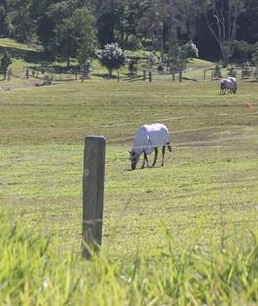Become a Qualified Agriculturist
 With a unique skills set, that sets you apart from your competition.
With a unique skills set, that sets you apart from your competition.
- Learn about the industry
- Learn the science that underpins good farming practices
- Learn farming techniques and management practices to make a career success in agriculture
This is a very solid certificate, involving around 600 hours of study, it is as intensive as diplomas at some institutions. Our certificate graduates have seen great success over the more than 3 decades we have been training people; and that has a lot to do with the quality of tutors, service, and the extensive nature of our courses. A longer course takes more effort; but to learn more anywhere, it always takes more effort. You cannot short track quality learning.
Course Contents and Structure
- Six modules need to be completed.
- Each takes 100 hours (approximately).
- There are three compulsory modules and a further three electives
COMPULSORY MODULES
Other electives may be possible. If you are looking for something else, contact us and discuss these with an academic officer. We are more flexible and offer more options than most institutions.
Agriculture Has a Bright Future .... If You Embrace Change
 Growing good animals or produce was sufficient for most farmers to make a profitable living - but not any more. Today's world is different though -increasingly; and farming is no longer just a way of life.
Growing good animals or produce was sufficient for most farmers to make a profitable living - but not any more. Today's world is different though -increasingly; and farming is no longer just a way of life.
Some farm businesses have learnt to adapt to the new world order (in agricultural business), but others have not.
All business today will have an element of risk; and the farm business as much as any, must learn to take calculated risks. But risk taking should always be based on thorough knowledge, thorough planning and thorough preparation.
The things you learn in this course are valuable for anyone working with horses - in a riding school, stud farm, stables or elsewhere; but they are also skills that can be applied more widely in the farm sector. This makes you more employable if your opportunities in the equine industry are weaker at times throughout your career.
In the past, a farmers market was frequently local, with most competition coming from the local area or state, or perhaps within the country. Markets are now international, competition can come from anywhere in the world, including from places where labour costs are very low. But just as competition has increased, so have opportunities. It is no longer unrealistic to look at overseas, as well as still cater for local markets.
Keeping abreast of what is occurring, both financially and socially, in overseas markets is important to the successful farming operation. If your country appears to be "flavour of the month" to the people in another country, what opportunities for your products or services could be found there? Expanding economies and increasingly higher standards of living in other countries are also creating new markets all the time. The market possibilities in a particular country may be short-lived, but who is to say that yet another country will not be interested in what you produce in later years. Making a high profit for a short period is also a good way to finance other, longer term ventures.
Many people are well aware of the opportunities in overseas markets, but find the prospect of getting contacts, organising the logistics, etc. unfathomable. Remember that not everything has to be done alone. Options include creating a co-operative with other similar producers, supplying a larger producer who already has the overseas markets, or working through an agent, who specialises in creating and catering to markets overseas. Government agencies may also provide excellent advice and even financial assistance to help you establish overseas markets.
Scale of production, as well as market opportunities, has also changed. It is cheaper to produce large quantities on large farms. Because the markets set the price on commodities, rather than the producers themselves, it is often unrealistic, or unprofitable, to enter such a market on a small scale. But that does not rule out being in a similar market. By creating a differentiation in your product, such as organic or high quality, you may in fact be able to enter a market that is more profitable.
What you learn in this course, can set you on a path to success; but success also requires other things as well as learning. Anyone can know what to do and still fail; if they don't act at the right time and in thew right way.
Any Questions?
Our tutors are more than happy to answer any questions, so please click here to ask a question.
Request a copy of our handbook here.